Interviewee – Ian Mytom, Patisserie Teacher – School of Travel Food & Drink (SPEAKING)
Music – A poppy, bassy instrumental dance-beat plays.
Scenery – As the screen slowly fades in from a dark blue screen filter, the camera flashes to a group of students wearing kitchen whites, busily preparing food on and around counters in a Leeds City College kitchen suite. The camera flashes to a close-up of hands covered in flour, shaping doughnuts on a counter, then to hands gently pressing cinnamon swirls into foil pastry trays. The camera flashes to a large pastry sheet on a counter as melted chocolate is spread across its centre. Throughout, a white logo in the screen centre reads “School of Travel, Food & Drink, Leeds City College” and a dark blue filter covers the screen.
Music – The volume lowers slightly, and the dance-beat loops and continues as background music.
Scenery – The dark blue filter fades. A man wearing a black face mask, chef whites and a black skull cap with short brown hair underneath speaks to a student as they work, they face away from the camera. The camera cuts to a mid-shot of the same man, now without a face mask, sitting towards the camera in a white kitchen suite. Three embroidered stars are visible above the left breast pocket on his white double-breasted shirt, and he has a light brown goatee with dark brown patches. A dark blue banner appears at the footer with white text that reads “Ian Mytom. Patisserie Teacher – School of Travel Food & Drink”. He speaks with a Yorkshire accent.
Speaker: Ian Mytom –
“Hi, my name’s Ian. I’m a participant Tutor at Leeds City College, uh, I team mainly Patisserie Level two and three….”
Scenery – As Ian speaks, the camera cuts to a side-angle of a student wearing Leeds City College chef whites. He sprinkles light brown sugar across a flat, round sheet of pastry on a stainless steel kitchen counter with cooking utensils and a rolling pin behind. The camera cuts to a close-up of his fingers in a pinched position, sprinkling. The camera cuts to a close-up of a rolled-out pastry sheet on a floured stainless steel worktop as a student generously sprinkles cinnamon across it with their right hand. The camera cuts to a hand toasting hazlenuts in a stainless steel pan over low heat, on a restaurant-standard hob. The camera cuts and zooms on a hand using a dough scraper to divide a piece of creamy-yellow dough with flecks of orange. The camera cuts back to Ian speaking.
Speaker: Ian Mytom – “I mean, patisserie is an amazing craft, you know – it sort of unlocks a lot of creativity that’s going on inside your head, I think. It starts with a sort of…well, a certain passion for being creative with colours and flavours…”
Scenery – The camera cuts to a close-up of a medium foil pastry case on a stainless steel worktop dusted by flour and cinnamon. A hand stands individual, uncooked cinnamon rolls together in the tray. A student wearing a white skull cap with hair net, blue face mask, and white apron stands at a worktop over a sheet tray of doughnuts. She gently presses a doughnut-cutter in the centre of one.
The camera cuts to a mid-shot shot of Ian in the kitchen suite, speaking to students while gesturing expressively with his hands. The camera cuts to a close-up of doughnuts in a wire basket, submersed and bubbling in a deep fryer. A round stainless steel skimmer appears to nudge a doughnut into place. The camera cuts to a close-up of a golden doughnut as it’s placed from the skimmer to a wire rack. The camera cuts to a student with thick-rimmed black glasses, as they pour Nutella from a jar onto a sheet of pastry and zooms on it being spread with a straight spatula. The camera cuts back to Ian speaking.
Music – The dance-beat loops and continues as background music.
Speaker: Ian Mytom – “I mean same as the savoury side of it, they are creative, but they’re, a different breed if you like. They’re a bit more what we call à la minute. Yeah, we are, we are in a very lucky position at college, uh, we are sponsored by certain companies…”
Scenery – While Ian speaks, the camera cuts to a kitchen suite with six students stood, working on stainless steel counters. Two students work together and one dips their fingers in a jug of water. All students wear skull caps, those with longer hair wear a hairnet in blue or white, and they all wear face masks. Cooking utensils and patisserie tools, including digital scales, mixing bowls and jugs, are on the worktops. A student facing away from the camera places a hand on an upturned white mixing bowl while gently wiping the surface sheet beneath it. A tutor wearing all black and a face mask approaches the group.
The camera cuts to a student placing a stainless steel pan on a surface followed by shaking their hand. They slide their left hand up their forearm as if pushing up a sleeve. The camera cuts to a close-up of a silicone sheet underneath three small foil tart cases with an uncooked pastry swirl inside. A hand places a fourth swirl into an empty tray and gently presses it down securely. The camera cuts back to Ian Mytom in the kitchen suite, and he gestures with his hands expressively.
Music – The dance-beat loops and continues as background music.
Speaker: Ian Mytom – “So, for example, Robot Coupe, uh, sponsor us, and they give us uh some of the state-of-the-art equipment to use, you know to try out using in these sort of conditions. We’re trying to set up a realistic working environment, and so they supply us with, uh, food processors and really fancy gadgets and things like that. Uh, my room in particular – we’re sponsored by MSK…”
Scenery – As Ian speaks, the camera zooms in on a student placing a smooth round pastry ball into a small foil tray. They use both hands to gently press it into place. They wear a floral face mask, chef whites and have a notebook, phone and pen neatly stacked beneath them. The camera cuts to a close-up of doughnuts submerged in oil, cooking in a deep fryer. A metal skimmer pulls away after moving a doughnut which settles into place.
Music – The dance-beat loops and continues as background music.
Speaker: Ian Mytom – “So they send us things like chemicals, to do molecular gastronomy – which is then helping the students see a more modern side of cooking that they might not see in, you know – other traditional cooking settings. If you’re training in a, you know, a certain style of restaurant or something like that, you know, we try to give a broad range of cooking techniques from classic to modern…”
Scenery – A close-up of a hand with pinched fingers sprinkles a stream of sugar until the screen fades entirely to dark blue. A white logo appears, reading “School of Travel, Food & Drink, Leeds City College”.
Music – The music ends with a bassy kick.


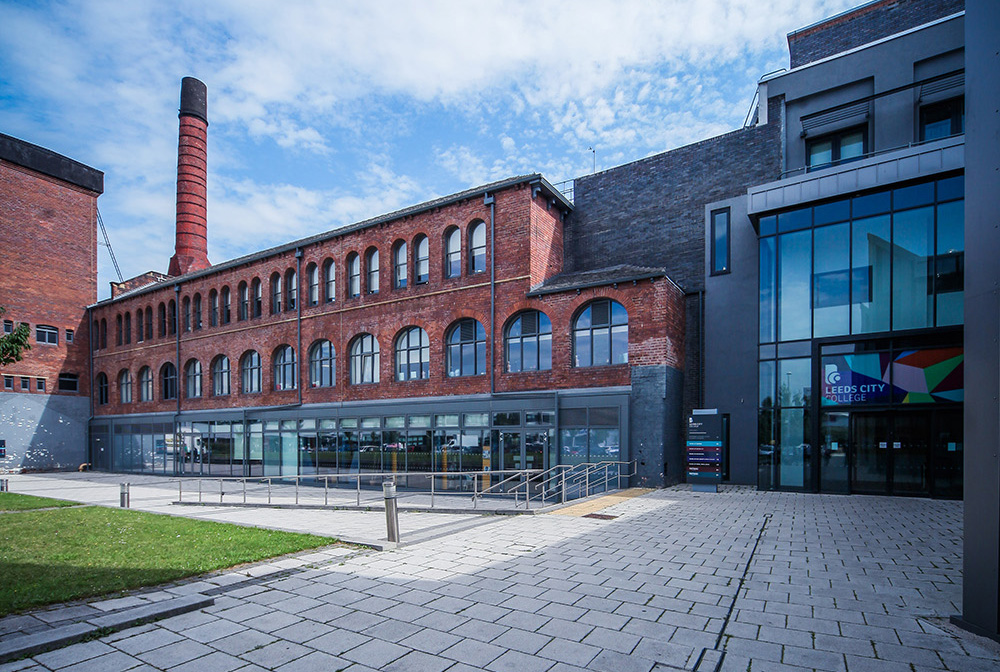
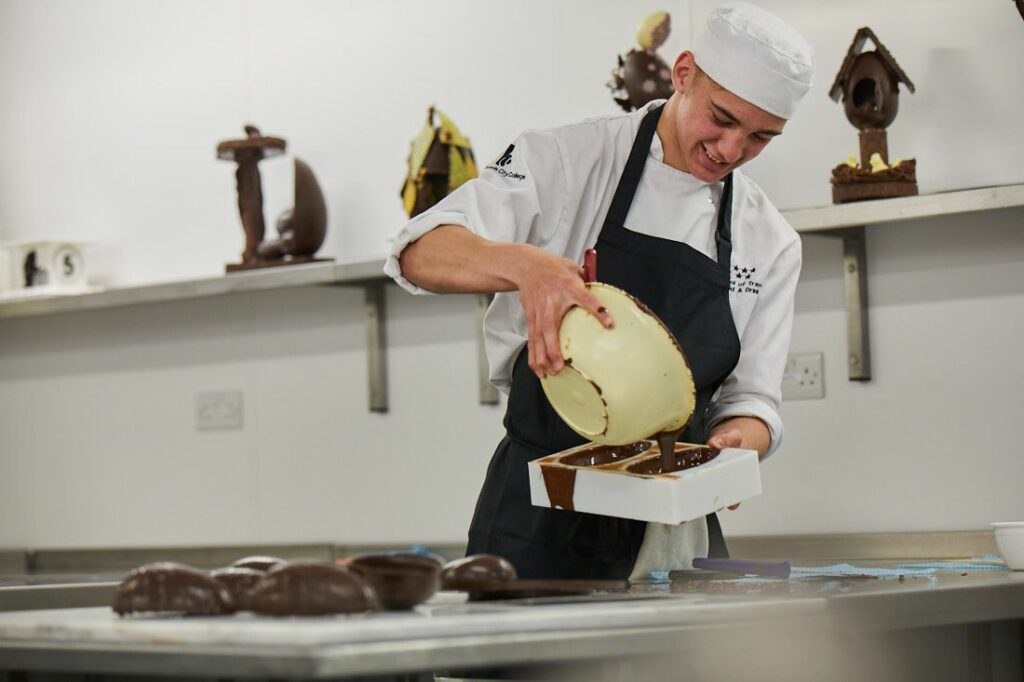
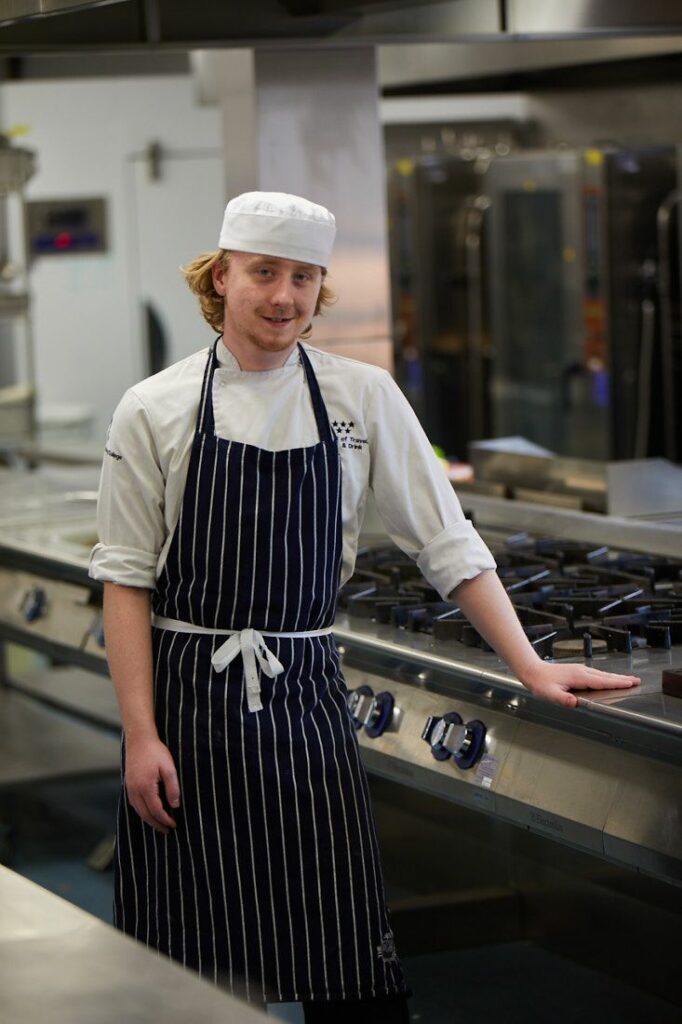
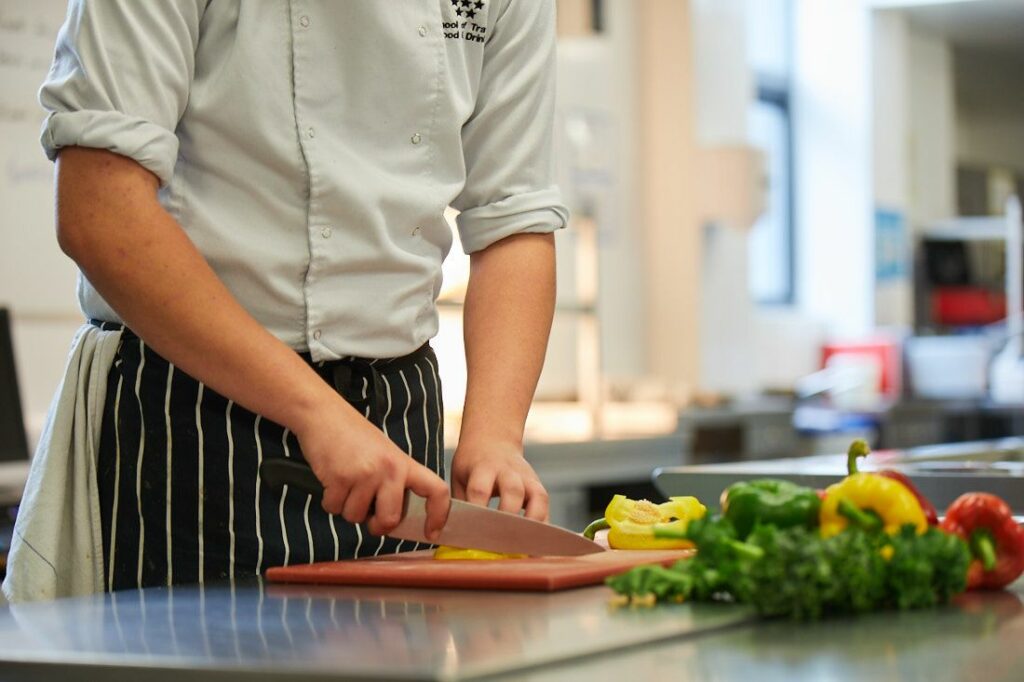
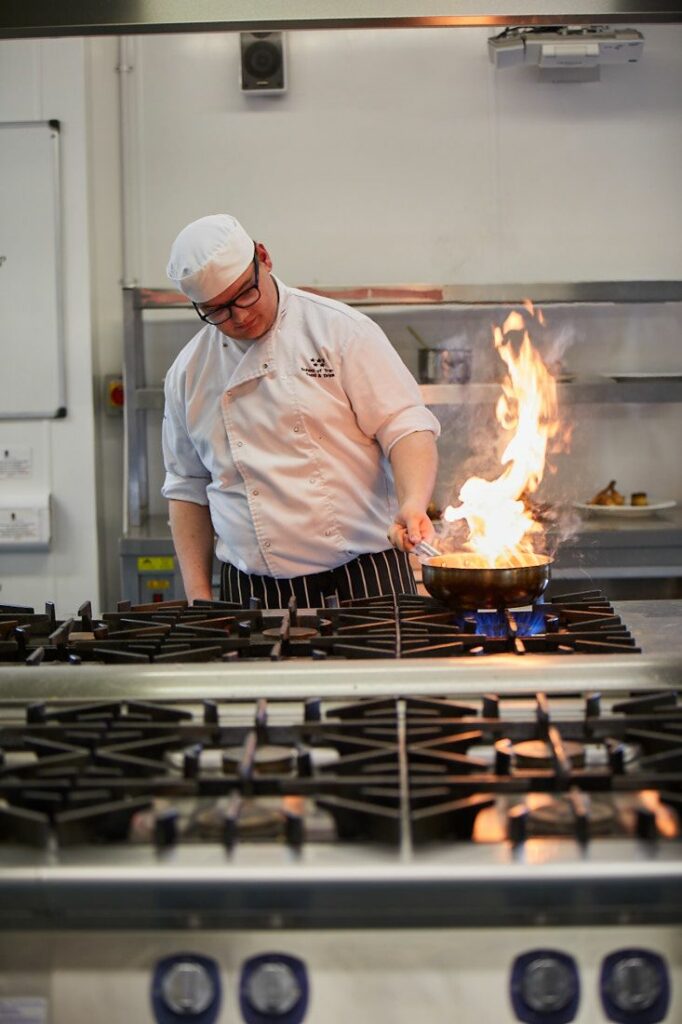
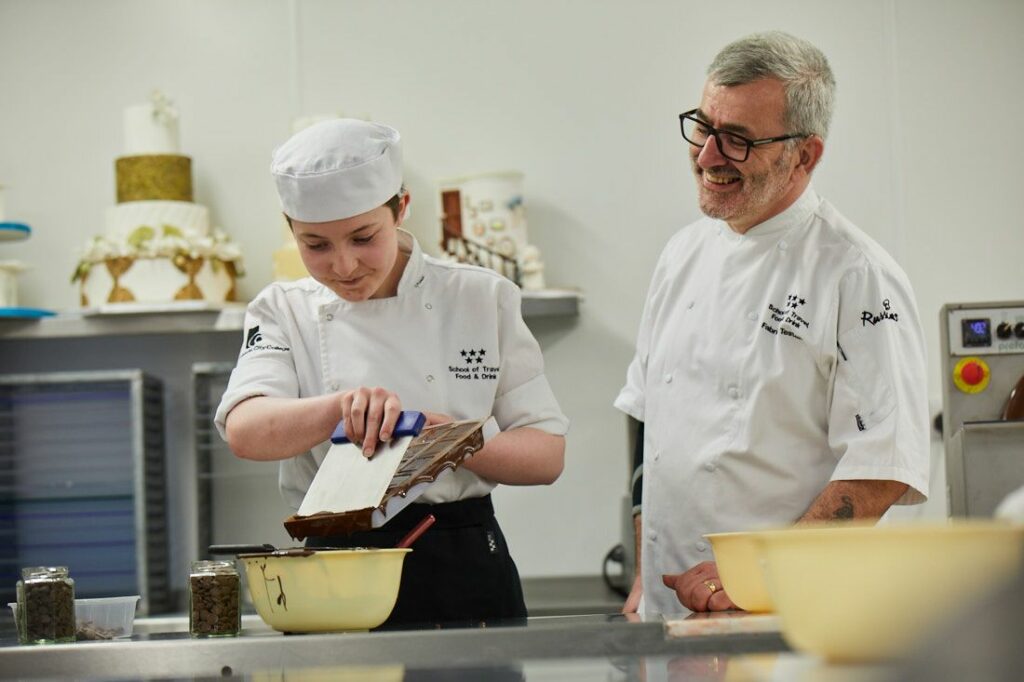
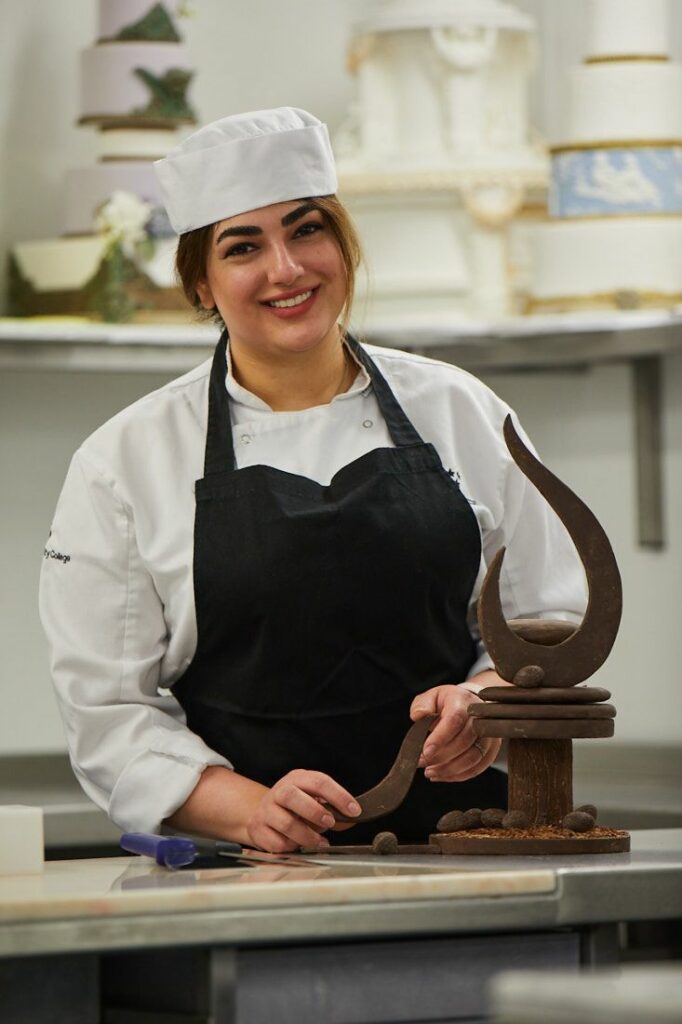
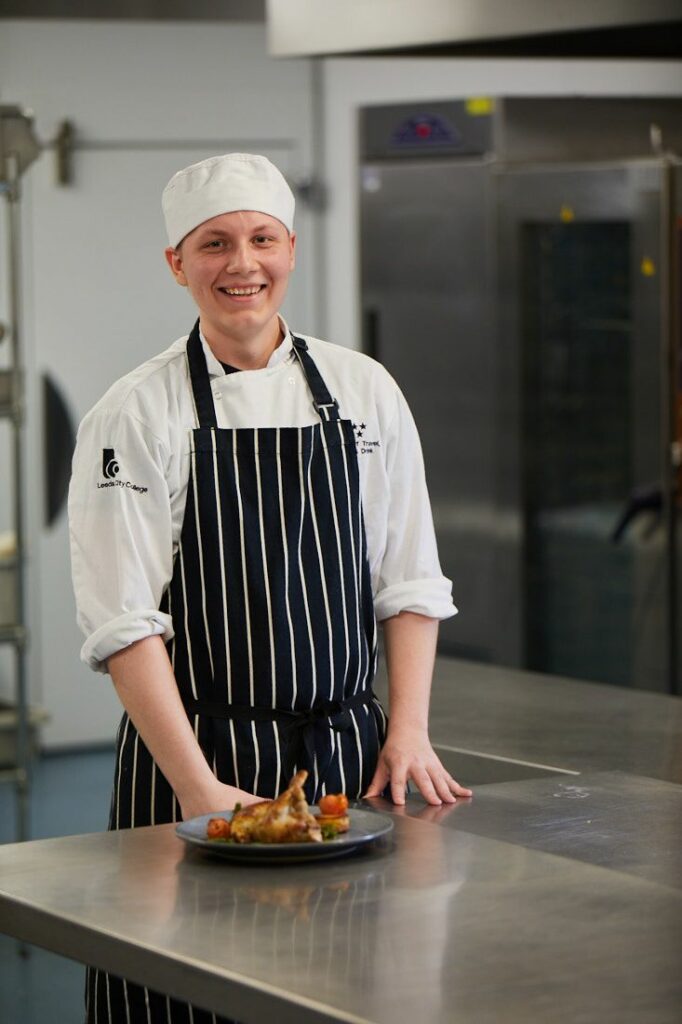
Follow us on Social Media